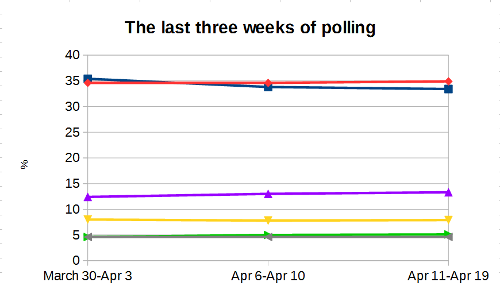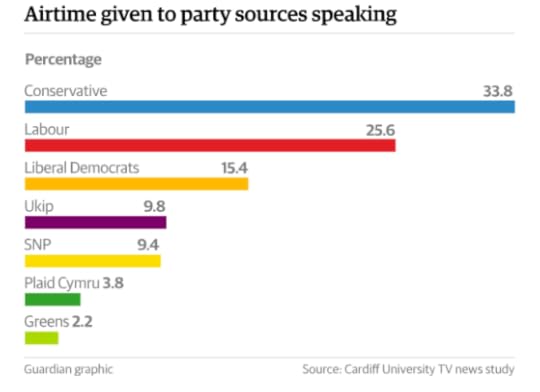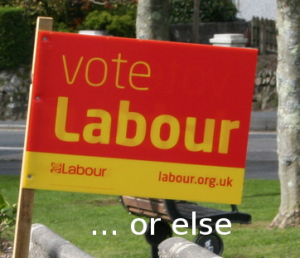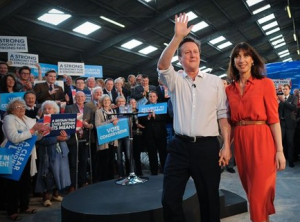Bernard Deacon's Blog, page 67
April 21, 2015
Public warning: conmen out and about in Cornwall
Hardly a day passes without either Cameron or Clegg popping across the Tamar for a quick photo-opportunity. A weekly hour of Poldark plainly isn’t enough to satisfy these boys. Yesterday it was the turn of Clegg to descend on us bringing the usual sack of gifts from the east but unaccompanied by any visibly wise men.
This time he was in St Austell trying to shore up the sagging campaign of sitting Tory Lib Dem Stephen Gilbert. We were promised cheaper petrol (greenest government ever?) and a doubling of the rate of council tax on second homes. Of course, as Clegg also yesterday ruled out a formal coalition with the SNP he’s left with only option, which is to prop up his old mate who leads the party of second home owners. So this is another promise that we can confidently add to the essentially meaningless list then.
It’s more about ratcheting up an apparent difference between the Glib Dem and Tory wings of the coalition Government as Clegg suffers terrible amnesia when it comes to the actual record of the past five years. In Cornwall, he calls on Labour voters to vote tactically for the Lib Dems. But of course, with the usual astonishing impudence, up in Sheffield where he’s defending his seat from Labour, he’s calling on Tories to vote tactically for the Lib Dems.
Mind you, to prove that it’s not that difficult to fool most of the people most of the time, especially in Cornwall, Lord Ashcroft happened to be conducting a focus group in St Austell and Newquay this week. Apparently, ‘most’ of those present thought Stephen Gilbert was a reincarnation of David Penhaligon. One proudly referred to his actions on the pasty tax. “He sorted that out. They wanted to charge you extra for a pasty!” The only tiny problem with this great success in saving us from the demonic pasty taxers is that most bakeries ARE charging the pasty tax. The notion that it was binned must rank as one of the biggest myths in Cornish history, up there with visits from the Phoenicians and the whisht hounds of Goss Moor.
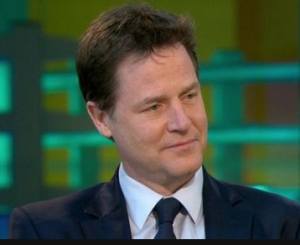 Pasty
Pasty Nick Clegg
Nick CleggAmazingly, Ashcroft concluded on the basis of this soul-destroying evidence of the political perspicacity of St Austell voters that for ‘the Cornwall [sic] participants’ local factors were pulling them towards the Lib Dems while ‘national’ factors pulled them towards the Tories. Which explains why they’re perfectly happy to go on voting for someone whose voting record in the last Parliament was the same as the Tories 98% of the time. Let’s see.
He voted strongly for
slashing welfare benefits
reducing corporation tax
raising tuition fees
privatising the Royal Mail
and strongly against
increasing taxes on those (hardworking) folk ‘earning’ more than £150,000 a year.
Not to mention being willing to sacrifice Cornwall’s 1,000 year old border in return for a lost referendum on the pathetic alternative vote.
Is there really no-one in St Austell supremely indifferent about which one of the Two Steves, the Liberal Tory one or the Tory Liberal one, actually wins the seat?

April 20, 2015
The unbearable daftness of tactical voting
At about this time in every general election there occurs a curious little ritual. After condemning the Labour Party for being insufficiently radical over the previous four or five years, Polly Toynbee in the Guardian calls on people to put on their nose pegs and vote Labour after all. This is supposed to be necessary to keep the Tories out. Sure enough, this last week, out came the nose pegs yet again as, for the fourth election in a row, Toynbee wheeled out her increasingly threadbare plea.
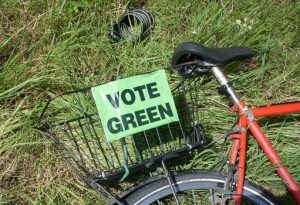 Run over by the Labour juggernaut?
Run over by the Labour juggernaut?This time, more specifically, she called on Green Party voters in Tory-Labour marginals not to vote Green but to cast their vote for Labour. This may be a slight improvement on a blanket call to everyone to vote Labour but is still deeply flawed. The call to vote tactically is just plain wrong for five main reasons.
First it’s extremely conservative. In two ways. How will we ever get a reformed voting system if we continue to vote for our second choice and allow Labour a majority? As in 2001, 2005 and 2010 we’re again urged to don nose pegs by the metropolitan liberal chaterrati. But doing so in 2001 and 2005 did not bring the much-needed reforms. Why should they do so now? It’s conservative in a second way too. Perhaps because voters on the left are more aware of the electoral context, they seem more prone to fall for the tactical voting scam than voters on the right.
Allowing the far right to rack up votes that aren’t balanced on the left would be a big mistake and brings us to the second reason why tactical voting is an error. It’s illogical. While it may make sense to vote tactically in the short term to stop the Tories, it hardly makes sense in the long-term. In a first past the post system if you can’t get seats then get votes. The more votes there are for the Greens, MK, TUSC or whatever, the more likely a Labour government would have to take their views into account rather than go on patronising/ignoring them.
It’s also important in the long-term to position your party in second place to have a chance of winning next time around. If you always vote tactically this can never happen. In fact, if voters had always voted tactically, then of course Labour would never have displaced the Liberals as the main opposition to the Tories.
Third, for most voters tactical voting is meaningless. There’s only around 100 or so constituencies, out of 632 in Britain, where tactical voting makes sense even in its own short-term terms. In most of southern England with its massive Tory majorities and in most of urban, northern England, with its equally massive Labour majorities, tactical voting makes no difference at all.
Fourth, it’s often a wasted vote. We rejected the explicit alternative vote, but parliamentarians still insist we have to exercise it informally. If we vote for anything but Labour/Conservative we’re told we’re in reality voting for the Tories/Labour and not for whatever we’re actually voting for. Which seems to make the simple business of casting a vote unduly complicated. In the absence of a proper proportional system it’s far easier to vote for our first preference, especially as every extra vote for that preference makes it less likely views you agree with can be ignored (again) after the election is over.
And where are we supposed to draw the line? We have marginal seats in Cornwall, but here a vote for Labour makes it more likely the Tories win. So here, appeals to Green and MK voters to vote tactically to stop the Tories logically means voting Lib Dem. Are Labour supporters calling on us to vote Lib Dem here then? Even the Guardianistas are now drawing the line at a vote for the discredited Tory-lite Lib Dems, who loyally supported the austerity budgets of the coalition government. Moreover, when two of our three Lib Dem MPs were indistinguishable from the Tories in supporting NHS ‘reform’ and the Devonwalling of our historic border, there seems little point in voting Lib Dem. From an MK perspective in particular, the party will only be able to break through over the dead body of the Liberal Democrats. Voting for them just to stop the Tories getting in is perverse in the extreme.
Finally, the call led by the Guardianistas for Greens, socialists and minority nationalists to vote Labour in Tory-Labour marginals is breathtakingly arrogant. Labour politicians are still living in the 1950s and dreaming of a two-party system. They seem to think they have some sort of God-given right to demand the support of progressives, despite embracing destructive neo-liberal policies since the 1990s.
In fact, there were two simple things Labour could have done to encourage the tactical voting it now belatedly calls for. In France the Socialist Party usually gives the Greens and Communists a free run in a few constituencies even though in most seats they compete against each other. This could also happen here. Labour could have stood aside and given the Greens a free run in Brighton Pavilion, Norwich South and Bristol West. If they’d done so, their calls for tactical voting would have some moral credibility.
But what did they do? On the contrary, they made Caroline Lucas’s seat one of their targets. And last year when they suddenly got frightened about a possible Green surge they set up a unit to ‘deal with’ the ‘threat’ from the Greens. With this record their calls for Greens to vote for them are a brazen cheek.
The other simple thing Labour could do to encourage tactical voting for them would be to promise the first act of a Labour Government would be to introduce a genuine PR voting system. If they did that progressives could consider voting for them once. Although Labour’s small problem might be that they’d never vote for them again afterwards.
[PS: In the unlikely event of anyone considering voting for Ukip reading this, just replace Labour with Conservative and Green/MK/socialist with Ukip/BNP]

April 19, 2015
The week’s polls – much sound and fury signifying nothing. Or subtle trends?
Daily polling this past week from YouGov tells a story of much sound and fury that signifies basically not much. Manifesto launches come and go, unfunded promises are scattered like careless confetti, leaders debates are endured and the real issues continue to be in the main ignored. But the voters remain largely unmoved.
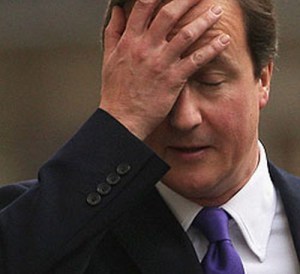 That said, can we detect a couple of trends over the first two weeks of the campaign proper? First, for the second week running we’ve seen Labour’s lead over the Tories widen. Cue panic among the Eton chaps. Second, if anything there’s evidence that the squeeze on the challenger parties by the old Westminster gang has stalled. For the second week running Ukip’s share of the polls has risen. So has that of the Greens, although by a tiny amount. And in Scotland, the SNP’s healthy lead over Labour remains solid. Time is running out for Scottish Labour, facing a PASOK style meltdown.
That said, can we detect a couple of trends over the first two weeks of the campaign proper? First, for the second week running we’ve seen Labour’s lead over the Tories widen. Cue panic among the Eton chaps. Second, if anything there’s evidence that the squeeze on the challenger parties by the old Westminster gang has stalled. For the second week running Ukip’s share of the polls has risen. So has that of the Greens, although by a tiny amount. And in Scotland, the SNP’s healthy lead over Labour remains solid. Time is running out for Scottish Labour, facing a PASOK style meltdown.
This may explain the growing squeals from Labour apologists as they urge potential Greens to vote tactically to stop the evil Tories. Although, given the far higher poll rating of Ukip, one might have thought they’d be better employed trying to think of ways of winning back their rightwards deserters.
Here’s the week’s poll changes and the recent trend.
w/e April 19
w/e April 10
change
Conservatives
33.4%
33.8%
-0.4%
Labour
34.9%
34.6%
+0.3%
Lib Dems
7.9%
7.8%
+0.1%
Ukip
13.3%
13.0%
+0.3%
Greens
5.1%
5.0%
+0.1%
SNP/PC
4.6%
4.6%
nc
Here in Cornwall the poster war is well under way. The strange thing however is the lack of Ukip activity on the ground, given their bragging last year about winning seats in Cornwall. The only Ukip leaflets received in our household have been accompanied by Chinese takeaway menus (difficult to know which is more appetising), suggesting Ukip is paying for delivery. The People’s Army seems to be sitting at home with its feet up, drinking cocoa.

April 18, 2015
Who’s going to come sixth? (or eighth?)
When the votes are counted in next month’s election it’s very likely that Ukip will gain a lot more votes than the Liberal Democrats. Yet Ukip will be lucky if they add to their current two seats, whereas the Lib Dems may well retain 25 or 30 of theirs. Our voting system produces bizarre outcomes such as this as well as acts as a powerful deterrent for new and challenger parties.
This of course all suits the established, conservative parties. It keeps unwanted and embarrassing issues well off the agenda. We can watch politicians squabbling over how much to cut or how far the deficit should be reduced to our hearts’ content. But we’re not exposed to discussion about why cuts or deficit reductions are required in the first place. It also usefully benefits the old parties by handing them a powerful ‘wasted vote’ weapon with which to discipline voters into sticking with familiar territory.
But the system is under threat. Its constraints creak as a changing kaleidoscope of micro-parties vie for consideration. Indeed, two micro-parties – Ukip and the Greens – are now poised to follow SNP and Plaid and be transformed into ‘mainstream’ parties. Which then makes the really interesting question which party will come eighth in Great Britain (Northern Ireland has had a fragmented party system for decades.)
Let’s look at micro-party performance over the past three elections. Ignoring parties which only stood only candidate, who scored the highest average vote in constituencies contested?
2001
mean vote (seats contested)
2005
mean vote (seats contested)
2010
mean % (seats contested)
1. Peoples Justice Party
7.9% (3)
1. Respect
6.8% (26)
1. Respect
6.8% (11)
2. Scottish Unionist Party
4.9% (2)
2. Community Action Party
5.6% (2)
2. British National Party
3.7% (338)
3. British National Party
3.9% (33)
3. British National Party
4.2% (119)
3. Ukip
3.6% (558)
4. Scottish Socialist Party
3.1% (72)
4. Green Party
3.3% (203)
4. Liberal Party
3.4% (6)
5. Green Party
2.7% (145)
5. Liberal Party
3.1% (14)
5. Lincs Independents
3.3% (3)
6. Liberal Party
2.3% (14)
6. Ukip
2.8% (496)
6. Trust Party
3.1% (2)
=7. Ukip
2.2% (427)
7. Residents Association of London
2.5% (2)
=7. MK
1.9% (6)
=7. Socialist Alternative
2.2% (2)
8. Scottish Socialist Party
1.9% (58)
=7. Socialist Alternative
1.9% (4)
9. MK
2.1% (3)
9. MK
1.7% (4)
9. Green Party
1.8% (335)
=10. Socialist Alliance
1.6% (98)
=10. National Front
1.6% (13)
10. Social Democratic Party
1.7% (2)
=10. Legalise Cannabis Alliance
1.6% (13)
=10. Forward Wales
1.6% (6)
Some of the relatively successful parties last time, notably the BNP, but also Respect and the Liberals, are standing far fewer candidates this time. So are the Christian Party and Socialist Labour Party. But they’ve been replaced by some new ones. Ignoring Ukip, which is standing 624 candidates this time, and the Greens with 593, the biggest micro-party interventions this time are
Party
Candidates
1. Trade Unionist and Socialist Coalition
126
2. English Democrats
32
3. Cannabis is safer than alcohol
26
4. Christian Peoples Alliance
17
5. Official Monster Raving Loony Party
16
=6. National Health Action Party
12
=6. Yorkshire First
12
=8. Socialist Party of GB
10
=8. Left Unity
10
=9. Socialist Labour Party
9
=9. Communist Party of Britain
9

April 16, 2015
How biased is TV news?
We know that the press in Britain is heavily biased in favour of the Conservative Party. But what about television news? A team at Cardiff University monitored coverage of the first week of official campaigning on the main BBC, ITV, Channels 4 and 5 and Sky News programmes.
The airtime devoted to party spokespeople broke down as follows …
On this measure, it seems that the TV news, from which the majority of voters are brainwashed get their information has an inbuilt bias in favour of the Tories. In relation to their current polling figures Labour did not receive its fair share. Neither did Ukip and the Greens. On the other hand the SNP and Plaid did very well (unlike their Cornish equivalent MK), receiving over four times their polling share. The other clear TV winner was the Lib Dems. Although only polling slightly above the Greens they got seven times more coverage and their share of airtime was over twice as generous as it should be, based on levels of support.

April 15, 2015
Postal vote fraud fears surface in Camborne and Redruth
Update: Further to the story below more evidence is coming to light that the Labour party in Camborne and Redruth is deliberately flouting Electoral Commission recommendations on how political parties should handle postal votes. The Commission recommended in January 2014 that party workers
“Should not take, complete or help to complete postal or proxy vote applications.”
Yet Labour in Camborne and Redruth offers on their website to ‘send a volunteer to bring a form and help fill it in‘
In 2010 21% of the 42,808 votes cast in the constituency were by post. If this proportion rises markedly this year we’ll need to ask how exactly this happened.
Concerns are growing in the Camborne and Redruth constituency over the way the Labour Party locally is handling postal vote applications. When Blair’s Government tried (and failed) to increase turnout by making it ridiculously easy to obtain a postal vote, it opened the door to fraud and vote rigging. A series of high-profile fraud scandals ensued, mainly involving Labour candidates in the big English cities.
So much so that a top judge last year concluded that postal voting enables election-rigging ‘on an industrial scale’ and was ‘unviable’. After peaking in the early 2000s fraud cases have tailed off although the possibility remains of widespread fiddling by political parties interfering in the process. In this context, some are worried that Labour’s practices in Camborne are bringing the possibility of similar manipulation of postal voting to Cornwall.
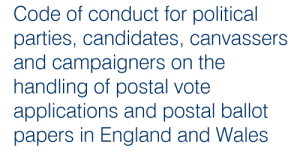 The Electoral Commission provides clear guidance for political parties. Why is this being ignored?
The Electoral Commission provides clear guidance for political parties. Why is this being ignored?The Electoral Commission’s Code of Conduct on handling postal votes clearly states
“because of the risk of suspicions that the application may be altered and the risk of the application being delayed or lost in transit, the local Election Registration Officer’s address should be the preferred address given for the return of application forms.”
In 2014 it went further and recommended specifically that political parties
“should not include an intermediary address for the return of postal or proxy vote applications – all applications should be returned directly to Electoral Registration Officers”.
But what do we find in Camborne and Redruth? There, accompanying an election communication from its candidate Michael Foster is an application for a postal vote. The party also kindly provides a freepost envelope for its return. Although voters are advised to return the form to Cornwall’s Electoral Registration Officer, whose address is given, the freepost envelope is instead addressed to the Labour Party at Commercial Square, Camborne. They then promise to send it on.
Why such a roundabout route to the Electoral Registration Officer? By blatantly ignoring the recommendations of the Electoral Commission in this way the Labour Party in Camborne might not be breaking electoral law, which is weak in this area. But it is sailing very close to the wind, and hardly acting in the spirit of the Electoral Commission’s recommendations.

April 14, 2015
Vote Guffogg? You could do a lot worse
When nominations closed last week, voters in Truro and Falmouth were annoyed and irritated to find that had even more candidates to choose from and complicate things on May 7th. Someone called Stanley Guffogg is standing, on behalf of a hitherto unknown outfit with the catchy name of ‘the Principles of Politics Party’. Like a lot of other people, my first reaction was ‘made-up name’ and ‘novelty candidate’, a Loony Party lookalike.
Alternatively this was one of those parties, essentially one-man bands, that emerge like butterflies out of their chrysalis at election time, only to suffer a quick death as they wither and perish after collecting their hundred or so votes and paying over their £500 deposit. Recent British electoral history is littered with the corpses of such short-lived micro-parties, slain by the first past the post fiend that guards the status quo and devours small parties by the score.
 Stanley Guffogg – PoP’s candidate
Stanley Guffogg – PoP’s candidateI was wrong. The Principles of Politics Party (PoP) may indeed fail to survive an electoral cycle but Truro has another genuine candidate, part of a small group which prefers to see itself as a ‘political collaboration’ rather than a party, despite its name. Stan Guffogg is a musician, python breeder and philosopher, although not necessarily in that order. He’s also an Oxford chap, having read PPE at The Queen’s College in the 1980s and then taught philosophy and economics at Truro College in the 2000s. His party has a decent and informative website (although one prone to crash on my computer.) PoP may well prove to be a transient phenomenon, briefly illuminating the tawdry landscape of electoral politics before its inevitable demise, but it has a message well worth listening to.
It’s driven by opposition to the neo-liberal consensus, which is ‘misleading and damaging’ and just plain wrong, having led to ‘debt-fetishism’. Instead, austerity has to be junked, the power of global corporations curbed and public services run as public services rather than businesses. Taxes ought to be progressive and mindless economic growth questioned, while drastic action is required to avoid ecological disaster
Which all looks like perfect common sense.
The only problem Principles of Politics might have, given that most Britons are clueless about most things, is that it seems to be run by philosophers and intellectuals. Meeting in Ponsanooth to chew over Plato’s concept of justice or Wittgenstein’s disputes with Popper over existentialism and logic is all very well, but how does it square with plodding the streets delivering leaflets? As Marx said, ‘philosophers have only interpreted the world … the point, however, is to change it’.
Instead, PoP admits that people may not ‘vote for the PoP party (so) at least give your vote to the only other party offering a real alternative to austerity – the Green Party’. Even Wittgenstein could see that this is spectacularly mistaken. The Green candidate is not the only anti-austerity candidate in Truro and Falmouth. There are already two other anti-austerity candidates in the field in this constituency – MK’s Stephen Richardson and Rik Evans of the National Health Action Party.
Stan Guffogg now makes this four anti-austerity candidates. So the important question that should have been pondered at Ponsanooth Philosophy HQ is why Truro & Falmouth? Why not the other Cornish constituencies where anti-austerity candidates are less commonplace? In fact, why not an English constituency where they’re often in even shorter supply?

April 13, 2015
Labour candidate in false poll claim storm
Why can’t centr(al)ist party politicians ever be honest with us? Take Michael Foster, Labour’s millionaire candidate for Camborne and Redruth, who’s pouring his cash into winning the seat. As his huge over the top Labour placards suggest, Michael is a firm believer that size matters. He’s also been over-egging things a bit when it comes to reporting recent opinion polls.
An election communication from him states ‘the recent opinion poll by Lord Ashcroft of people in Camborne, Redruth and Hayle puts Labour neck and neck with the Conservatives‘.
Actually, it does nothing of the sort. The poll, taken on 24th-26th March, shows the following.
When asked how people would vote if there was an election tomorrow, voters responded like this
Conservative
39%
Labour
26%
Ukip
14%
Lib Dem
10%
When asked how they would vote when they considered their local candidates they replied as follows
Eustice (Conservative)
37%
Foster (Labour)
24%
Smith (Ukip)
14%
Goldsworthy (Lib Dem)
13%
‘Neck and neck’ in Labourland seems to mean running 13% behind the Tories. By the same logic Labour is ‘neck and neck’ with Ukip and the Lib Dems, as the gap back to those parties is less than that to the Tories. Was this just an unfortunate typo? Or did it result from an inability to understand statistics? Or is it best described as a downright lie deliberately employed to mislead voters?
It’s hardly surprising that around a fifth of voters believe all politicians are corrupt. Foster can’t be the only joker in the pack. There must be other examples of dodgy misuse of polls or voting data across Cornwall. If you come across anything similar why not put a comment here or get in touch.

April 12, 2015
An election of quiet desperation
Like the smog in south-east England, this week an air of unreality descended to blanket the election. On the one hand voters were faced with a blizzard of promises and threats, on the other the whole charade was revealed to be a micro-managed publicity stunt. The Conservative Party promised to properly fund the NHS; Labour promised to take on the super-rich. Both hoped people would overlook the tiny detail that neither has any track record in either of these areas.
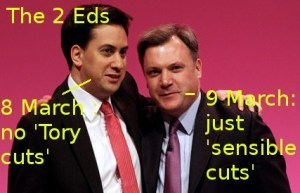 Both continue to demand a blank cheque. The Tories refuse to spell out where they’d make their cuts, or how they’d fund the NHS; Labour prevaricates. One minute it’s sticking with its pledge to match Tory/Lib Dem austerity and merely replace ‘Tory’ cuts with ‘sensible’ cuts, the next it’s implying that perhaps no further cuts will actually be necessary, although ruling out the tax rises that could make this possible.
Both continue to demand a blank cheque. The Tories refuse to spell out where they’d make their cuts, or how they’d fund the NHS; Labour prevaricates. One minute it’s sticking with its pledge to match Tory/Lib Dem austerity and merely replace ‘Tory’ cuts with ‘sensible’ cuts, the next it’s implying that perhaps no further cuts will actually be necessary, although ruling out the tax rises that could make this possible.
Meanwhile, the great British, or should that be English, electorate stumbles on in the dark, no wiser and a large chunk of them unable to get up the energy to care any more. Bribes and cajolements are one half of the parliamentarians’ assault on our senses. The other is threats. The politics of promises have to be laced with a strong dose of fear. If we don’t vote Conservative we face a ‘coalition of chaos'; if we don’t vote Labour we might as well volunteer to carry Cameron back into Number 10 on our shoulders.
Interpellated by the parties as ‘hard working families’, real families work hard to sieve understanding from a process designed more to legitimate the power of a well-heeled and well-entrenched ruling elite than enable us consumer-subjects to choose our representatives. There’s nothing new in this of course. Almost as soon as the landed class began reluctantly to extend the franchise in 1832 political parties have been pulled into the breach to organise and discipline voters as well as MPs.
For almost two centuries now parliamentary parties have functioned to channel the potentially unruly energy and vision of ordinary folk into support for a parliamentary elite. Activists’ dreams and desires are sucked up by these party black holes as they’re transformed into a supporting role. This meets its nadir in the banal spectacle of appearing as bit-part actors in a parliamentary tableau. A gang of credulously naïve supporters are cajoled into standing behind candidates holding up witless and irritating signs and grinning moronically. Seemingly pioneered by the Liberal Democrats, who deserve to roast in hell for this innovation, this excruciating form of self-abasement is now commonplace.
This role as a willing but essentially brain-dead tribalist backdrop was exposed here in Cornwall this week when Cameron visited ‘all the nations’ of the UK in a day. Either taking his own nation – England – for granted, or unable to count beyond four, Cameron ended up at the show ground at Wadebridge, apparently under the delusion Poldark had been filmed there. What looked on TV like an eager crowd of hundreds of supporters was later revealed as a small bunch of Tory enthusiasts huddled at the very end of a large, cavernous exhibition hall.
The symbolism of this, bromidic sound-bites chaotically colliding in a vast empty space, was not lost. Even journalists from Britain’s shackled press and the BBC’s Ministry of Truth were by the end of the week pointing to the absurd levels of micro-management being applied by paranoid party spin-doctors. Despite jetting around the UK (greenest government ever) Cameron for example has yet to have an unplanned, spontaneous encounter with an actual voter, someone not invited or vetted by his team.
As the hydra-headed Cameron/Clegg/Farage/Miliband monster stalks the land with its message of quiet desperation and business as usual, one of the most popular questions on Google has been ‘can I vote for the SNP if I live in England?‘ While demonstrating that the project of dumbing down the population to the point where it’s fit only to languish in a neo-liberal hell is working well, this question has undertones of an endearing yearning for something, anything, better than the current ‘offer’.
And no, they can’t vote for the SNP in England. But in Cornwall surely we can vote for something very close. It comes in the shape of MK, the party that must not be named, even if it’s banned by the Ministry of Truth until polls safely close on May 7th. Perhaps MK should make more of this.
And if anyone is able to raise a flicker of interest, here’s this week’s poll movements to peruse while I return to lie down in a darkened room.
w/e April 10
w/e April 3
change
Conservatives
33.8%
35.4%
-1.6%
Labour
34.6%
34.6%
nc
Lib Dems
7.8%
8.0%
-0.2%
Ukip
13.0%
12.4%
+0.6%
Greens
5.0%
4.6%
+0.4%
SNP/PC
4.6%
4.6%
nc

April 7, 2015
The other election next month: local election preview
You wouldn’t guess it but lurking behind the parliamentarians’ (actual and wannabe) jamboree there’ll be another election on May 7th. This ghost election will be largely ignored in the media but involves people across England electing around 9,400 councillors onto district councils, metropolitan districts and a few unitaries. Indeed, the only major place in England without a local election is London, plus a few counties in the peripheral north and west. There’s also no local elections in Scotland, Wales and Northern Ireland. Nor in Cornwall, where district councils were found to be surplus to requirements in 2009.
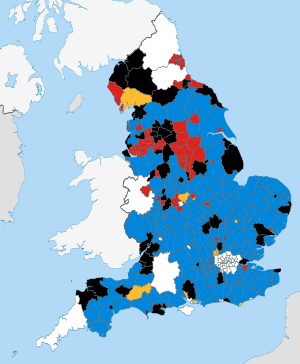 Local authorities with elections next month
Local authorities with elections next monthAlthough they’ll be buried in the media circus that will accompany the formation of a coalition government to nominally run the state on behalf of finance capitalism for the next five years, local elections may tell us a lot more about the way the wind is blowing and the prospect for long-term electoral change. Parliamentary elections depend on spending power and access to a media that may be ‘free’ but enjoys no freedom. Local elections depend more on enthusiasm, activism and organisation.
The first thing to look out for when nominations close on Thursday will be the number of candidates. How many unfortunates for example will have their arms twisted to stand for the toxic Lib Dems? How many will be standing for the challenger parties of Ukip and the Greens or anti-austerity parties such as TUSC?
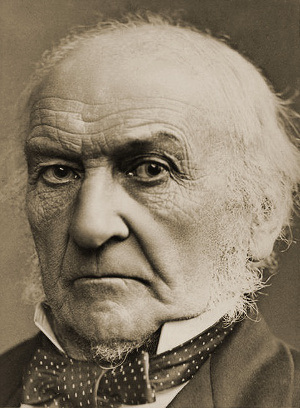 Gladstone would have found our current voting system quite familiar, although we have a lot fewer elections these days in Cornwall
Gladstone would have found our current voting system quite familiar, although we have a lot fewer elections these days in CornwallSecond, what will the likely effect be of combining elections at different levels? In most advanced European democracies they don’t vote for different levels on the same day; in Germany it’s against the constitution to combine Federal and Lander elections for instance. But if it was good enough for the Victorians then it’s certainly good enough for us.
The turnout when there’s a general election will be around twice the normal local election turnout. People who don’t normally bother to vote for their local councillor will be surprised at being asked to vote for one. This traditionally helps the Labour Party, which has more of these ‘can’t be arsed’ supporters. Indeed, in 2001 and 2005, when county council elections coincided with general elections Labour got an artificial boost. This is likely to help them in urban areas but in the rural districts they’re too far behind to make a huge impact and it’s unlikely that Labour will be contesting every seat anyway.
The challenger parties might actually benefit. This outcome could be the result of the current squeeze on them. As that squeeze is ramped up by a breathless media in a tight election, it’s possible that those tempted to vote ‘tactically’ (pointless in any case outside a 100 or so constituencies) will salve their guilty consciences by using the locals as an opportunity to vote for their real preference, be it Ukip, the Greens or others. This is even more likely as a large proportion of district council wards elect two or three councillors, providing plenty of opportunity for splitting the ticket in novel ways.
Of course, this could also have the effect of making it even more likely people succumb to the threats and promises of the ConLabs and waste their parliamentary vote by using it ‘tactically’. Nonetheless, look for possible Ukip and Green gains in the local elections even if a general election breakthrough still eludes them.
In Cornwall, we can only look on from the sidelines, enviously or thankfully, apart from at Camborne Treswithian and Constantine, where there are by-elections. Our district councils were unilaterally destroyed and the number of elected representatives slashed by two thirds from 332 to 123 by Labour and the Lib Dems in 2009. Is anyone in the austerity Con/Lab/Ukip/LibDem consensus suggesting the restoration of local democracy?
I thought not. Quite the opposite; voices from that neo-liberal consensus sagely inform us that we still have too many, not too few, representatives, despite the 63% cull in 2009. In fact, as Cornwall Council is effectively run by a coalition of developers and council bureaucrats, we might as well save even more money by getting rid of local elections in Cornwall entirely as befits our colonial status.

Bernard Deacon's Blog
- Bernard Deacon's profile
- 3 followers


